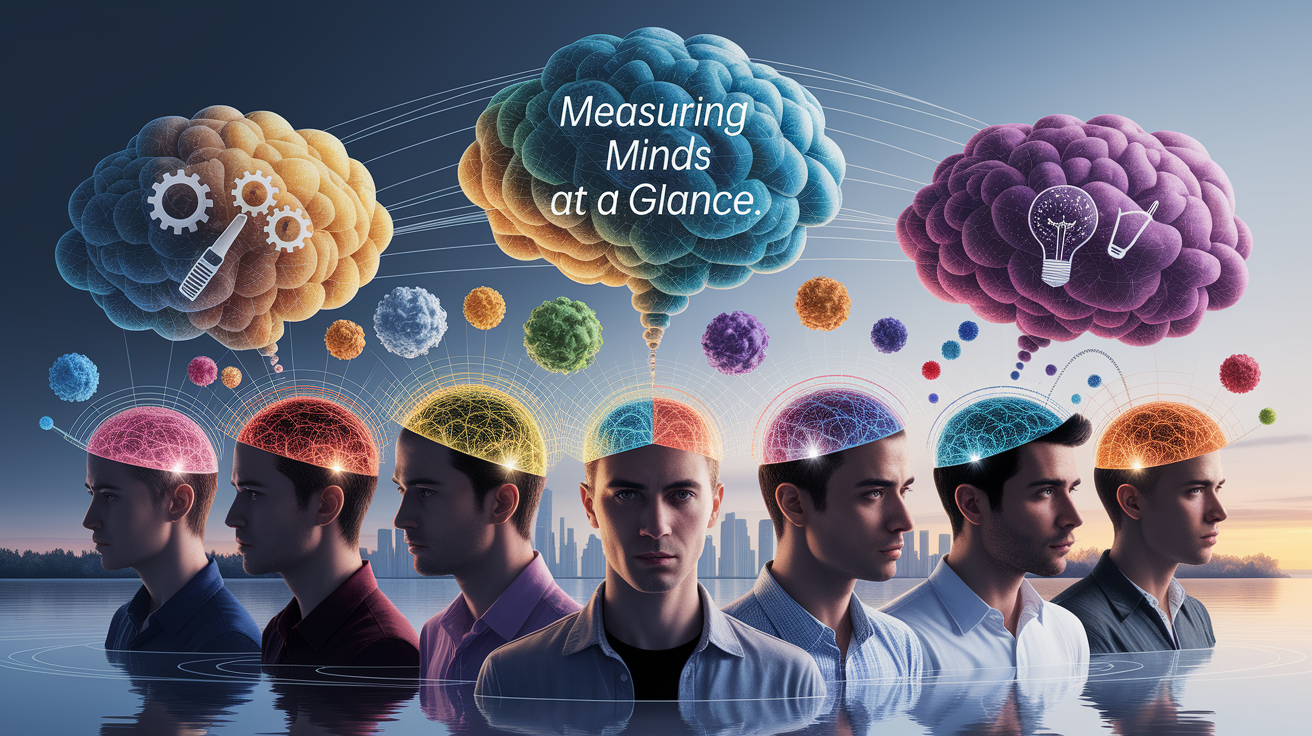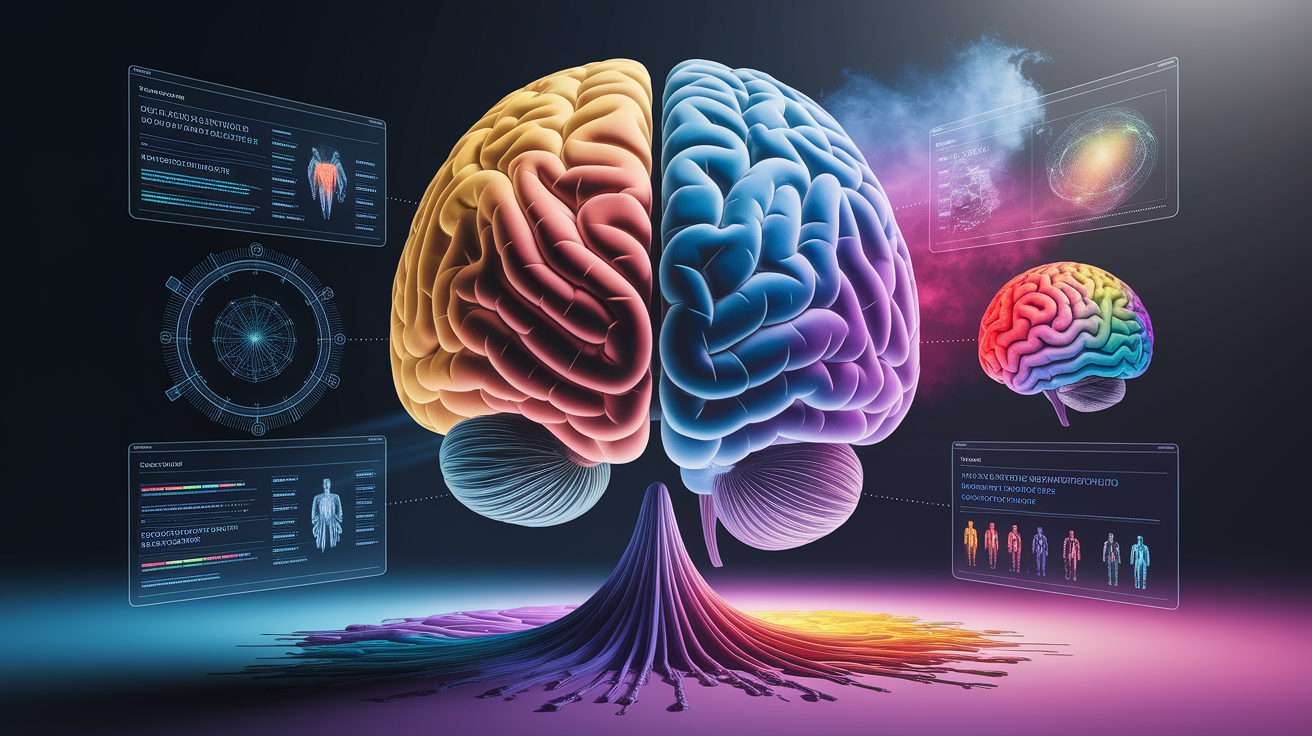Unveiling Psychometrics: A Clear Guide to Measuring the Mind
Measuring Minds at a Glance
What is psychometrics? At its core, psychometrics is a field of study within psychology that focuses on the theory and technique of measurement. This scientific discipline covers the construction of assessment tools, measurement instruments, and formalized models to quantify and measure various mental attributes, behavior, and performance.

The term ‘psychometric’ derives from two root words: ‘psycho’ (mental) and ‘metric’ (measurement). This branch of psychology measures knowledge, personality, attitude, intelligence, behavior, and other abstract mental faculties. In essence, psychometrics bridges the gap between understanding human behavior and mental processes and the rigorous statistical methods needed to quantify them accurately.
The importance of psychometrics extends far beyond academic curiosity. In our data-driven world, the ability to measure psychological constructs reliably influences everything from educational policy to hiring decisions, clinical diagnoses to personal development programs. By applying the scientific nature of psychology, psychometricians create standardized, objective measures that help us understand the complexities of human cognition and behavior.
Core Principles of Psychometric Assessment
The foundation of psychometric assessment rests on several key concepts that ensure the accuracy and fairness of psychological measurement. Understanding these principles is crucial for anyone working with or interpreting psychological tests and assessments.
Reliability: The Consistency Factor
Reliability refers to the consistency of measurement across time, situations, and populations. A reliable psychometric test produces similar results when administered multiple times under similar conditions. Test reliability calculation involves several statistical approaches, including test-retest reliability, internal consistency measures, and inter-rater reliability.
For example, if an intelligence test yields significantly different scores for the same individual within a short timeframe without any intervening learning or development, the test lacks reliability. High reliability is essential because inconsistent measurements cannot provide meaningful insights into psychological constructs.

Validity: Measuring What Matters
While reliability ensures consistency, validity ensures that a test measures what it claims to measure. Test validity types include content validity, criterion validity, and construct validity. Each type addresses different aspects of measurement accuracy and appropriateness.
The difference between psychometrics and psychological testing often lies in the rigorous attention to validity. Psychometric approaches emphasize comprehensive validation to ensure that assessment tools are not only consistent but also meaningful and accurate representations of the psychological constructs they purport to measure.
Statistical Foundations
Modern psychometrics relies heavily on sophisticated statistical models. Classical test theory provides the traditional framework for understanding measurement error and reliability, while modern test theory, including item response theory, offers more nuanced approaches to test construction and analysis.
Factor analysis plays a crucial role in identifying underlying psychological constructs and validating the structure of psychological instruments. These statistical techniques help psychometricians understand how individual test items contribute to overall measurement accuracy and construct validity.
Tools of the Trade: Psychometric Methods
Psychometric methods encompass a diverse array of assessment tools and analytical techniques designed to measure various aspects of human psychology and behavior.
Intelligence Tests and Cognitive Assessment
Intelligence tests represent some of the most well-known psychometric instruments. These assessments measure cognitive abilities such as reasoning, problem-solving, and processing speed. Popular examples include the Wechsler Adult Intelligence Scale (WAIS) and the Stanford-Binet Intelligence Scales.
Cognitive assessment extends beyond traditional IQ testing to include measures of specific cognitive functions such as memory, attention, and executive functioning. These targeted assessments are particularly valuable in clinical psychology assessment and neuropsychological evaluation.
Personality Assessment Tools
Personality assessment represents another major category of psychometric tools. Personality questionnaires like the Big Five Inventory, Myers-Briggs Type Indicator, and Minnesota Multiphasic Personality Inventory (MMPI) help measure enduring patterns of thoughts, feelings, and behaviors.

These instruments often measure constructs closely related to emotional psychology, including traits that influence how individuals experience and express emotions. Some assessments specifically target emotional intelligence, measuring abilities related to perceiving, understanding, and managing emotions.
Aptitude Testing and Educational Measurement
Aptitude testing focuses on measuring potential for learning or performance in specific areas. These assessments predict future success in academic or professional contexts. Examples include the SAT, GRE, and various professional licensing examinations.
Educational measurement extends to achievement tests that assess current knowledge and skills in specific subject areas. The importance of psychometrics in education cannot be overstated, as these tools inform curriculum development, student placement, and educational policy decisions.
Scale Development and Test Construction
Creating effective psychometric instruments requires systematic scale development processes. This involves item generation, pilot testing, statistical analysis, and iterative refinement. Test construction follows established protocols to ensure that new instruments meet rigorous psychometric standards.
The process includes extensive test validation procedures, including content expert reviews, statistical item analysis, and comprehensive validation studies with diverse populations.
Real-World Uses of Psychometrics
The applications of psychometrics span numerous fields and industries, demonstrating the versatility and practical value of psychological measurement.
Industrial and Organizational Psychology
In business settings, psychometric assessments serve multiple purposes. The best psychometric tests for hiring help organizations identify candidates who possess the necessary skills, personality traits, and cognitive abilities for specific roles. These assessments reduce hiring bias and improve employee selection processes.
Using psychometric data for talent management extends beyond initial hiring to include employee development, team building, and leadership assessment. Organizations use personality assessments to understand team dynamics and optimize workplace relationships.
Clinical and Healthcare Applications
Clinical psychology assessment relies heavily on psychometric tools to diagnose mental health conditions, monitor treatment progress, and evaluate intervention effectiveness. Standardized assessments provide objective measures that complement clinical observation and professional judgment.

These applications require careful attention to ethical considerations in psychometric testing, including informed consent, confidentiality, and cultural sensitivity. Healthcare applications must meet stringent standards for accuracy and reliability given their impact on patient care decisions.
Educational Policy and Research
Educational measurement informs policy decisions at local, national, and international levels. Large-scale assessments like NAEP (National Assessment of Educational Progress) and international comparisons such as PISA (Programme for International Student Assessment) guide educational reform efforts.
Researchers use psychometric methods to study complex psychological phenomena, test theoretical models, and evaluate intervention programs. The psychometric analysis of survey data enables researchers to draw valid conclusions about population characteristics and trends.
Technology and Innovation
Online psychometric testing platforms have revolutionized assessment delivery and accessibility. These digital solutions enable remote assessment, automated scoring, and real-time feedback while maintaining psychometric rigor.
Technological advances continue to expand the possibilities for psychological measurement, including adaptive testing algorithms that adjust difficulty based on individual responses and innovative assessment formats that capture complex behaviors and skills.
Becoming a Psychometrician
Careers in psychometrics and assessment offer diverse opportunities for professionals interested in the intersection of psychology, statistics, and measurement science.
Educational Requirements
How to become a certified psychometrician typically requires advanced education combining psychology, statistics, and measurement theory. Most positions require at least a master’s degree, with many roles preferring doctoral-level training.
Essential coursework includes statistical analysis in psychology, measurement theory, test construction, and research methods. Students benefit from hands-on experience with statistical software and real-world assessment projects.

Professional Roles and Responsibilities
Psychometricians work in various settings, including educational institutions, research centers, private testing companies, and government agencies. Their responsibilities include:
- Developing and refining assessment tools
- Conducting statistical analyses of test data
- Validating tests to ensure fairness and accuracy
- Training others in proper test administration and interpretation
- Researching new measurement methodologies
The theoretical foundation for this work often draws from modern psychological theories that emphasize quantifiable measurement and scientific rigor.
Skills and Competencies
Successful psychometricians combine technical expertise with practical application skills. Key competencies include:
- Advanced statistical knowledge and software proficiency
- Understanding of psychological theory and measurement principles
- Communication skills for explaining technical concepts to diverse audiences
- Attention to detail and commitment to ethical standards
- Critical thinking and problem-solving abilities
The Score of Clarity: Putting It All Together
Psychometrics represents a crucial bridge between abstract psychological concepts and concrete, measurable data. By applying rigorous scientific methods to the measurement of mental attributes, psychometricians provide tools that enhance our understanding of human behavior and support evidence-based decision-making across multiple domains.
The field’s emphasis on reliability, validity, and statistical rigor ensures that psychological assessments meet high standards for accuracy and fairness. Whether measuring intelligence, personality, aptitude, or other psychological constructs, psychometric methods transform subjective observations into objective, quantifiable data.
Key Takeaways
Understanding how to interpret psychometric test results requires knowledge of both statistical concepts and psychological theory. For practitioners and consumers of psychological assessments, several key points emerge:
- Reliability and validity are fundamental requirements for any psychological measurement
- Different types of assessments serve different purposes and require different interpretation approaches
- Ethical considerations must guide all aspects of test development, administration, and interpretation
- Technological advances continue to expand possibilities while maintaining psychometric standards
- Professional training and ongoing education are essential for competent practice in this field
As our understanding of human psychology continues to evolve, psychometrics will remain essential for translating theoretical insights into practical applications. The field’s commitment to scientific rigor and ethical practice ensures that psychological measurement will continue to serve individuals, organizations, and society in meaningful and beneficial ways.
For those interested in pursuing careers in this field or simply seeking to better understand psychological assessment, the fundamental principles of psychometrics provide a solid foundation for appreciating both the power and the responsibility inherent in measuring the human mind.







